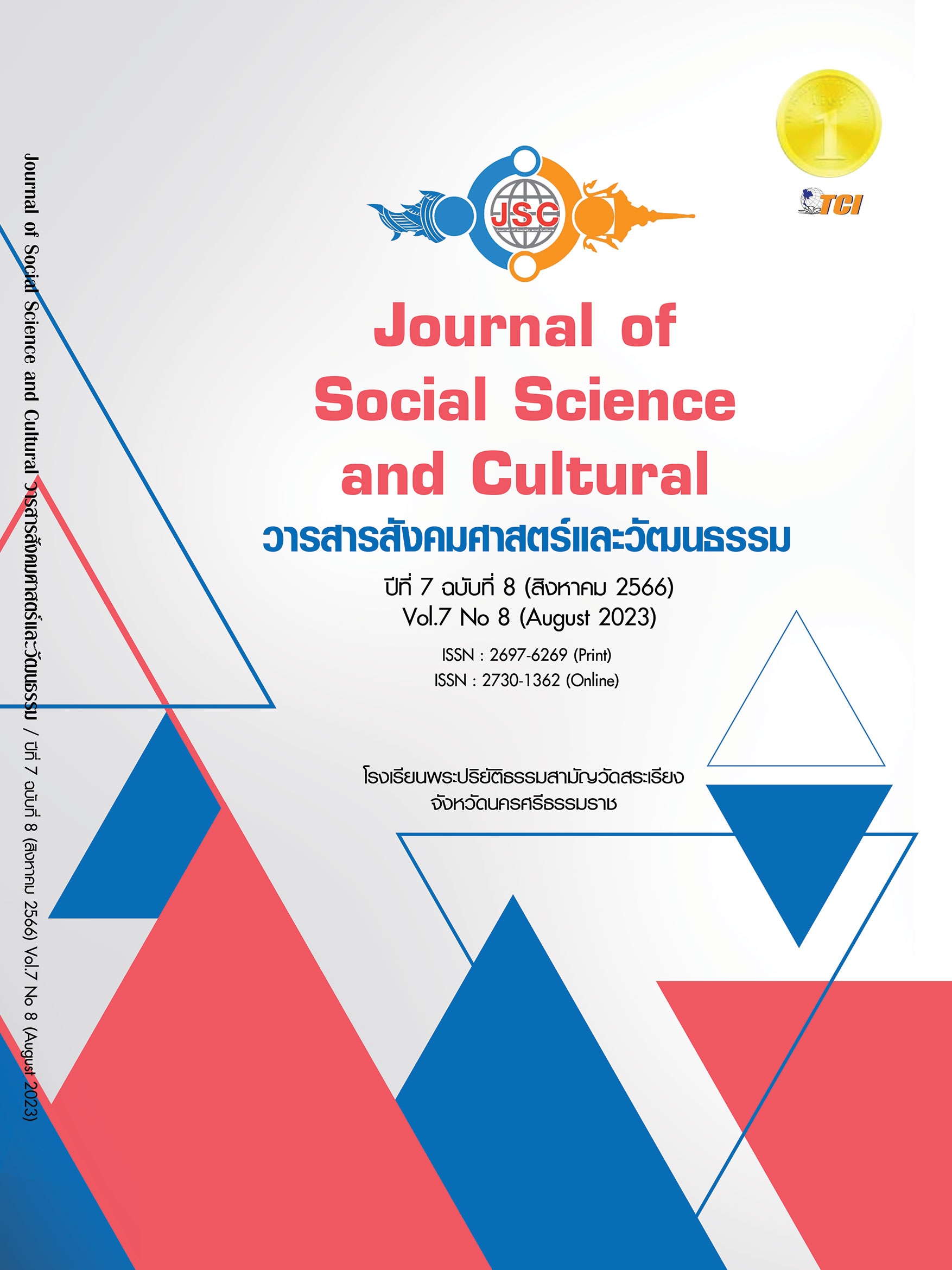ANTI - CORRUPTION WAR: A STUDY OF CONCEPTUAL METAPHORS OF THAI AND CHINESE PEOPLE
Main Article Content
Abstract
This research aims to study metaphorical expressions reflecting conceptual metaphors [Anti-Corruption is war] in Thai and Chinese online news based on the metaphorical framework by Lakoff and Johnson. It employs a qualitative and quantitative research method, collecting Thai language data from the Thairath online website and Matichon Online, and collecting Chinese data from Xinhua News website and Central Discipline Inspection and Supervision Commission website between January 1, 2020, and April 30, 2022. The research findings are presented using a descriptive research method. This study found 24 metaphorical expressions about war in Thai online news and 61 metaphorical expressions about war in Chinese online news. The metaphorical expressions observed indicate that both Thai and Chinese speakers share the concept that [Anti-Corruption is war]. However, there are some differences in the usage of metaphorical expressions about war between Chinese online news and Thai online news. Specifically, the group fighting against the enemy represents the effort to solve corruption problems. Since anti-corruption is an important mission for the Chinese government, it aims not only to make the public understand the dangers of corruption but also to convey its standpoint and ideas regarding anti-corruption and persuade the public to cooperate in the fight against corruption. The shared concept of corruption among Thai and Chinese speakers arises from similar sociocultural experiences, while the selection of different metaphorical expressions about war is associated with different social conditions.
Article Details
References
กนกกาญจน์ วรสีหะ. (2555). "การชุมนุมทางการเมืองคือการทำสงคราม" มโนทัศน์ที่สะท้อนจากอุปลักษณ์ข่าวการชุมนุมทางการเมืองจากหนังสือพิมพ์ไทย. วารสารสถานบันวัฒนธรรมและศิลปะ มหาวิทยาลัยศรีนครินทรวิโรฒ, 13(2), 49-55.
ชัชวดี ศรลัมพ์. (2548). อุปลักษณ์ตามแนวคิดของภาษาศาตร์ปริชาน. วารสารศิลปศาสตร์, 5(1), 1-16.
ซูเจิน หนง. (2553). การเปรียบเทียบอุปลักษณ์เชิงมโนทัศน์ในข่าวเศรษฐกิจภาษาไทยและภาษาจีน. ใน วิทยานิพนธ์ศิลปศาสตรมหาบัณฑิต สาขาวิชาภาษาไทย. มหาวิทยาเกษตรศาสตร์.
ทำเนียบรัฐบาลไทย. (2564). ข่าวนายกรัฐมนตรี. เรียกใช้เมื่อ 20 มีนาคม 2565 จาก https://www.thaigov.go.th/news/contents/details/41778
ธนพล เอกพจน์. (2561). อุปลักษณ์เชิงมโนทัศน์ความจนในภาษาไทย: กรณีศึกษาการใช้ภาษาบนเว็บไซต์ของพันทิปดอทคอม. รมยสาร, 16(1), 377-400.
ธนพล เอกพจน์ และคณะ. (2563). [ไวรัสโคโรนาสายพันธุ์ใหม่ 2019 คือ ศัตรู] : การศึกษาอุปลักษณ์เชิงมโนทัศน์ของคนไทย ตามแนวภาษาศาสตร์ปริชาน. วารสารภาษา ศาสนา และวัฒนธรรม, 9(1), 1-37.
นววรรณ พันธุเมธา. (2063). คลังคำ ฉบับปรับปรุง. กรุงเทพมหานคร: อมรินทร์.
ปิยะธิดา อภัยภักดิ์. (2561). แนวทางการป้องกันและปราบปรามการทุจริตคอร์รัปชันในหน่วยงานภาครัฐ. วารสารบัณฑิตวิทยาลัย มหาวิทยาลัยราชภัฏจันทรเกษม, 13(1), 1-12.
ราชบัณฑิตยสถาน. (2554). พจนานุกรม ฉบับราชบัณฑิตยสถาน พ.ศ. 2554. เรียกใช้เมื่อ 20 มีนาคม 2565 จาก https://dictionary.orst.go.th
วรวรรณา เพ็ชรกิจ. (2551). การศึกษาอุปลักษณ์ที่เกี่ยวกับโรคมะเร็งในภาษาไทยตามแนวปริชานศาสตร์และวัจนปฏิบัติศาสตร์. ใน ดุษฎีนิพนธ์อักษรศาสตรดุษฎีบัณฑิต สาขาวิชาภาศาสตร์. จุฬาลงกรณ์มหาวิทยาลัย.
วุฒินันท์ แก้วจันทร์เกตุ. (2555). กิเลส: การศึกษาอุปลักษณ์เชิงมโนทัศน์ในภาษาไทย. วารสารมนุษยศาสตร์, 19(2), 24-41.
สัมฤทธิ์ น่วมศิริ และคณะ. (2562). การทุจริตคอรัปชั่นกับสังคมไทย. วารสารบัณฑิตศาส์น, 16(2), 282-291.
อภิษฎาข์ ศรีเครือดง และคณะ. (2560). การเสริมสร้างจิตสำนึกการป้องกันการทุจริตคอรัปชั่นขององค์กรปกครองส่วนท้องถิ่นในสังคมไทย. วารสารการบริหารท้องถิ่น, 10(3), 28-51.
อาทิมา วรินทร์อุดมสุข. (2561). อุปลักษณ์ที่แสดงมโนทัศน์น้ำท่วมในข่าวภาษาไทยและภาษาฝรั่งเศส. ใน วิทยานิพนธ์ศิลปศาสตรมหาบัณฑิต สาขาวิชาภาษาศาสตร์เพื่อการสื่อสาร. มหาวิทยาลัยธรรมศาสตร์.
เอกพล ดวงศรี. (2566). สงคราม (โรค) โควิด 19: อุปลักษณ์เชิงมโนทัศน์ของสังคมไทยและโลกที่สะท้อนผ่านหนังสือพิมพ์ไทยออนไลน์. มนุษยศาสตร์สาร, 24(1), 226-251.
Dictionary Editing Office of CASS中国社会科学院语言研究所词典编辑室. (2016). XIANDAI HANYU CIDIAN现代汉语词典. Beijing: The Commercial Press.
Dong, W., & Zheng, K. . (2015). A Comparative Analysis of Anti-Corruption Metaphors in News Discourses between English and Chinese. Journal of Taizhou University, 37(5), 36-40.
Gao, L., & Ge, H. . (2020). Analysis of Official Anti – corruption Discourse from the Perspective of Cognitive Metaphor. Journal of Huaiyin Institute of Technology, 29(6),46-50.
Huang, J. (2015). การศึกษาเปรียบเทียบอุปลักษณ์ในข่าวกีฬาหนังสือพิมพ์ภาษาไทยและหนังสือพิมพ์ภาษาจีน. ใน วิทยานิพนธ์ศิลปศาสตรมหาบัณฑิต สาขาวิชาภาษาไทย. มหาวิทยาลัยเกษตรศาสตร์.
Intawong, P., & Sirimongchol, A. . (2019). CONCEPTUAL METAPHOR OF WAR IN THAILAND'S 2019 ELECTION IN ONLINE NEWS. GANESHA JOURNAL, 15(2), 33-44.
Ji, Y. . (2021). A Study of Conceptual Metaphor in Xi Jinping’s Anti-Corruption Discourse from the Perspective of Cognitive Linguistics. In Master of Arts. Liaoning Normal University, Dalian.
Lakoff, G., & Johnson, M. (1980). Metaphor We Live by. London: The University of Chicago Press.
Lakoff, G., & Johnson, M. (2003). Metaphor We Live By. London: The University of Chicago Press.
Liu, X. (2018). A Study of Conceptual Metaphor in China’s Anti-Corruption News Discourses. In Master of Arts. Zhengzhou University, Zhengzhou.
Ma, Y. (2017). 汉·韩反腐新闻语篇的认知语义对比研究. In Master of Arts. Tianjin Foreign Studies University, Tianjin.
Pan, Z. (2020). A Comparative Study of Corruption Conceptual Metaphor in Russian and Chinese Political News. In Master of Arts. Shanghai International Studies University, Shanghai.
Transparency International. (2022). CORRUPTION PERCEPTIONS INDEX. Retrieved March 20, 2022, from https://www.transparency.org/en/cpi/2022
Xi, J. . (2014). 习近平谈治国理政 (Xi Jinping The Governance of China). Beijing: Foreign Languages.
Yao, S. . (2019). อุปลักษณ์เชิงมโนทัศน์ “ความฝันจีน” กับยุทธศาสตร์การบริหารประเทศของประธานาธิบดีจีนสีจิ้นผิง. วารสารอักษรศาสตร์, 48(1), 1-40.
Yuan, X. (2022). 2023年反腐怎么干?中央释放重大信号. Retrieved May 12, 2023, from https://www.chinanews.com.cn/gn/2022/12-07/9910295.shtml.


